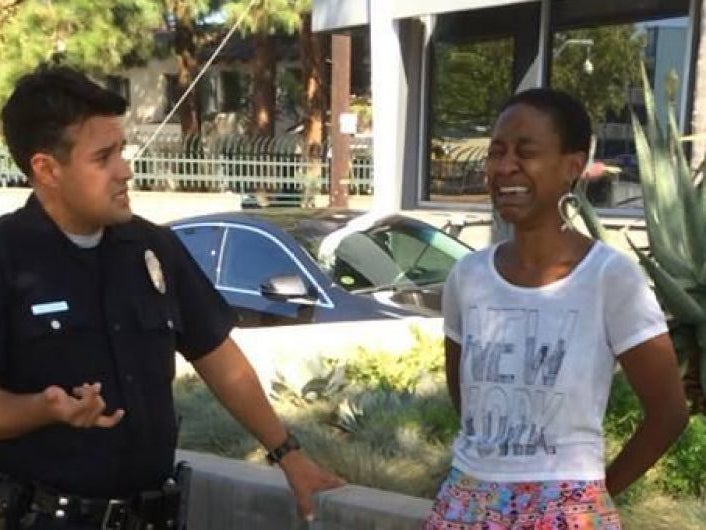Would Daniele Watts have been arrested if she was a white woman, or a black man?
It's dangerous to be black in America full stop, but being a woman as well means you face both racism and misogyny

Dressed in baggy patterned shorts, trainers and a loose fit tee, black actress Daniele Watts says she was recently mistaken for a prostitute by Los Angeles police. Watts and her husband had been kissing on a Hollywood street when authorities were alerted and apparently mistakenly identified the amorous couple as a call girl and client.
Their mistake, however, wasn’t resolved with red faces and fervent apologies; when Watts refused to provide ID to officers, she was put into the back of a police cruiser, guilty of nothing more than being a black woman in a inter-racial relationship.
Now as allegations surface that the two were engaged in what the police refer to as a “lewd act”, it’s her word against the accusers, with sympathy immediately turning to scorn as the mere accusation of indecency is enough to invalidate Watts’s account.
Trayvon Martin, Eric Garner, Michael Brown and the other recent killings of unarmed black men have brought to attention just how dangerous it is to be a black man in the United States. If Watts’s account is true, it has further highlighted the fact that it is dangerous simply to be black in the United States, full stop.
If no misconduct occurred then as it stands in the US, black women are sexualised to such a degree – and black people criminalised to such a degree – that bystanders are unable to fathom something as common as an interracial relationship in anything other than sexual terms, despite an incumbent biracial president.
Stories such as these show why intersectionality is crucial to any discussion of racism and, more pressingly, any discussion of feminism. We must face the facts – this would not have happened to Watts had she been a black man, nor would it have happened if she were a white woman. Her status at the intersection of both racial and sexual prejudice is what makes her and other black women privy to the toxic combination that is racism and misogyny.
Is it easier to believe that a minor celebrity and beau locked in a curbside embrace were mid-transaction rather than in a relationship? That a sexual dynamic between the two is understandable, but anything beyond this was impossible to comprehend.
In Django Unchained, a film wrought with racial conflict, Watts had a memorable bit part as Coco — a tiny, teetering slave meets sex toy, dressed in a French maid’s outfit for the titillation of her white owner. She was a sex doll mid dress-up; her sole purpose to sate both the domestic and sexual needs of white men. It’s sad but not all too surprising that even after the costume change, Watts should feel that the LAPD are still unable to distinguish the present from America’s murky past.
The words of Watts could quite easily have come from the mouth of one of Coco’s enslaved contemporaries — “I cry for a country that calls itself ‘The land of the free and the home of the brave’ and yet detains people for claiming that very right."
Whether racism and sexism played a part in the arrest and detainment of Watts or not, it'd be naive to pretend that they never do.
Join our commenting forum
Join thought-provoking conversations, follow other Independent readers and see their replies
Comments
Bookmark popover
Removed from bookmarks